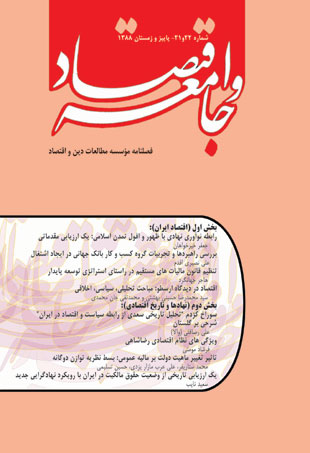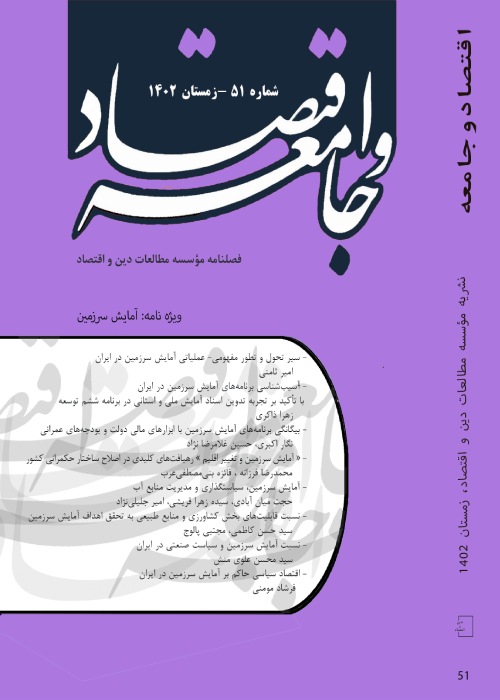فهرست مطالب

نشریه اقتصاد و جامعه
پیاپی 21-22 (پاییز و زمستان 1388)
- 288 صفحه، بهای روی جلد: 20,000ريال
- تاریخ انتشار: 1388/10/11
- تعداد عناوین: 8
- بخش اول: اقتصاد ایران
- بخش دوم: تاریخ اقتصادی
-
صفحه 187
-
Page 11What Factor or Factors were the main cause of great scientific upheaval and establishment of Lustrous Islamic Civilization in its climax? This is an important question, forwhich several hypothetical answers are given. The hypothesis followed in this paper is that in the initial stages, Islamic Caliphs had no option but to create their own new institutions to confront their enemies. Existence of ahigh degree of competitors from various religions and civilizations lead them to undertake institutional innovations such as starting negotiations with foreigners and getting loanfrom them, initiating translation resurgence of other religions and civilizations, recognizing the importance of free expression and open exchange of ideas and thoughts andpublic discussions and free and open trade leading to a high growth.
-
Page 35“Doing Business group “of the World Bank influenced by Ronald Coase Transaction Cost Theorem and Hernando de Soto “dead Capital “theory, aim to find the main factorsleading to high cost of economic activities and preventing the movement of resources from unproductive to productive new business. They tried to find reason for the followingtriple questions:1-Why doing business is easy in some countries but difficult in others? 2-Why the Scale of informal activity are so high in some countries? 3-Why informal sectors are so reluctant to entre formal activities, reducing the size of the economy? We found that their main emphasize has been on deregulation of economic activities and facilitation of doing business through smoothening of regulations. This is regarded as a key factor for flourishing formal economic activities and employment generation.
-
Page 83We try in this Paper, to analyze Direct tax Law in line with sustainable development strategy on the basis of the present world economic conditions. It is believed that sustainable development theory is based on changing world economy. Therefore, to match ever changing world economy, Iran, has to re-assess its economic policies. In this regard in line with sustainable development strategy draw up its direct tax system parallel to the needs and requirement of the world economy.
-
Page 103In this paper we try to explore economic aspects of Aristotle view and thoughts. Our purpose is to see if he touched upon any economic reasoning in his analysis? What are they if there is any? and how credible might be those expression based on the premises of the contemporary economic science? Can we integrate Aristotle moral and political view to economics? How feasible it might be for the present generation of thoughts. Although Aristotle did not vividly discuss economic phenomena, a deep probing of his writings enable us to grasp important and valuable economic analysis specially in discussion of subjects such as price analysis and the impact of social institutions on economic stability and practical economic analysis.
-
Page 133In this paper by searching through our cultural heritage and tracing our rich literature we try to understand the historical roots of underdevelopment of Iran and to see if we can suggest any appropriate solution? We provide a positive answer substantiating it by drawing on institutional economics. We show in this paper how path dependency of the country has been deepened and explain the way institutional obstacles as described in the first volume of Golestan of Sadi imposed a brake on the country development. We find that Sadi has successfully described the impact of politics on economics and show how despotic regimes and its supported intellectual mentalities block the way of development by creating vested interest group and their own peculiar socio-economic and cultural order. The paper conclude that without creating efficient political market and opening historical dependency ties, the country would not meet its development target.
-
Page 187The Purpose of this paper is to investigate the extent of institutional changes in Reza Shah Dynasty as compared to the previous era and see how effective were these changes in overcoming deep rooted development barriers at that historical time. We follow historical analytical method based on institutional thinking. On the bases of credible documents and evidence, in this paper, we show that most of institutional changes taking place in this period were of formal characters, being completely abstract from informal institutions. We, therefore, believe that formal institutional changes took place at that time, could not have enough impact for development.The changes introduced at that time concentrated mainly on official institutions, disregarding, and unaccompanied by informal institutions nullifying official efforts to overcome historical obstacles of underdevelopment of Iran.
-
Page 217Different schools of thought have different approaches regarding the sphere of government activities. They assume different roles and duty to the government. Dualistic balance theory maintains that interaction of economic and political market shape the nature of government and justifies its performance. Rule of Law is considered as an important factor to bring about competitive governments. Each government has its own “Functional Peculiarities” in public finance, facilitating and or blocking the path of development.
-
Page 253The main purpose of this paper is to provide a theoretical framework for property rights in Iran. Following New Institutional Economics to emphasize the quality of institutionsas the main determinants of costs of maintaining exclusive ownership rights. We divide the cost into three distinct parts such as measurement costs, ownership costs and transaction costs corresponding to the institutions of state, technology andmental behaviors. We believe in Particular that two groups of factors namely the state and mental behavior s in Iran are mainly responsible for raising ownership costs leading to inappropriate propertyrights formation and its enforcement.


